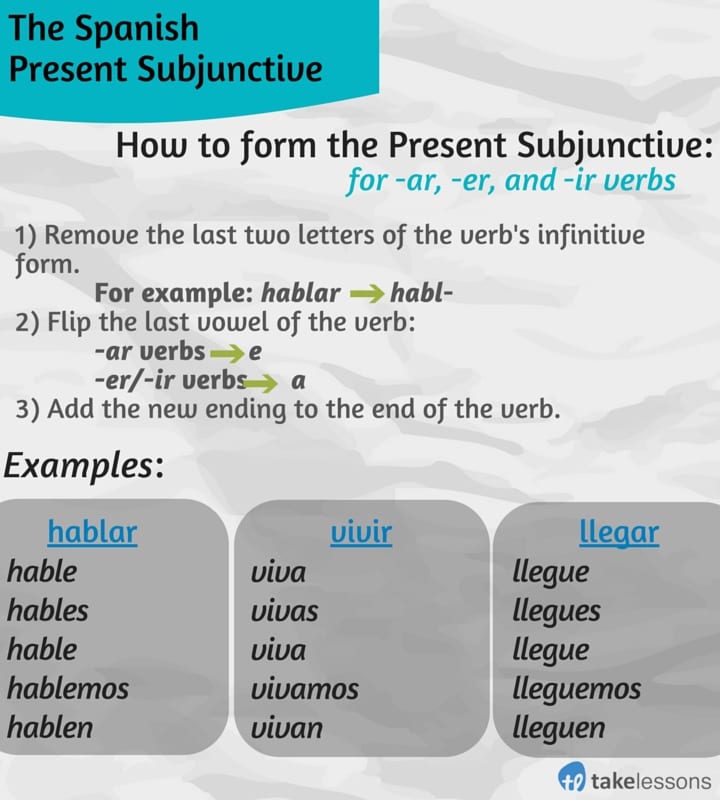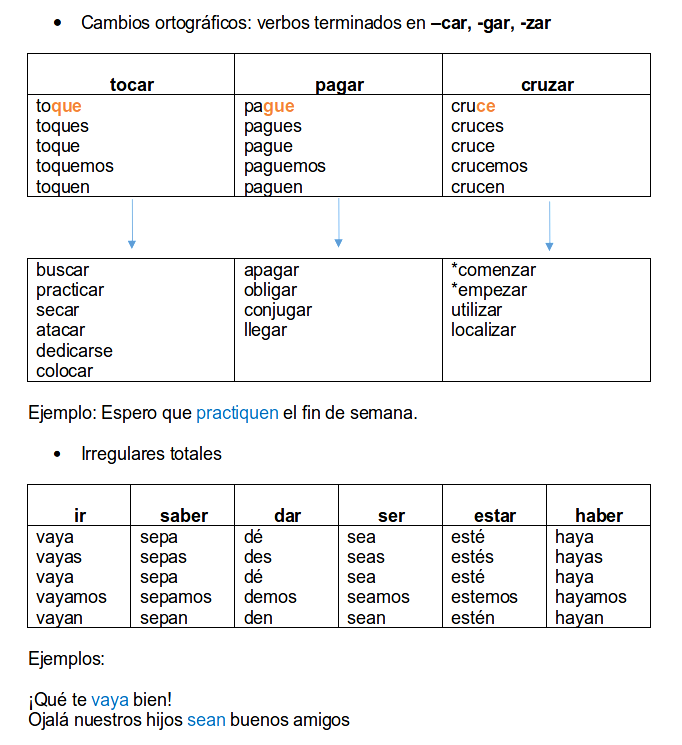

These structures evaluate an action or situation from a neutral perspective. Our friend Paula recommends travelling via night trains.

Example: Nuestra amiga Paula recomienda viajar en los trenes nocturnos. This indicates that the speaker is making a general recommendation. is not directed at a specific person, we use the infinitive in the subordinate clause. If the advice/recommendation/suggestion etc. ■ Common verbs: (des)aconsejar, exigir, recomendar, sugerir, proponer, ordenar, prohibir, pedir, etc.

They don’t recommend wasting time with tour guides. No nos recomiendan que perdamos el tiempo con guías turísticas. All our friends advised us to save Italy until last. Examples: Todos nuestros amigos aconsejan que reservemos Italia para el final. Examples: ¡ Ojalá gane en el bingo esta tarde! Hopefully I win at the bingo tonight! ¡ Que tengas suerte en el bingo! Good luck at the bingo! Advice, suggestions, orders and requestsĪdvice, recommendations, suggestions, proposals, orders and requests are all expressed in the subjunctive. The expressions ¡Ojalá.! and ¡Que.! introduce the subjunctive and express a wish for the present or the future. I want to do a trip around Europe with Catalina. Example: Tengo ganas de hacer un viaje por toda Europa con Catalina. When followed by an infinitive, these verbs refer to the same subject as in the main clause. subject 1 (yo) + que + subject 2 (Catalina) I want Catalina to go backpacking around Europe with me. Example: Quiero que Catalina haga un viaje de mochileras por Europa conmigo. When followed by que + subjunctive, they express the speaker’s wish towards another person. Common verbs and structures: esperar, desear, preferir, querer, soñar con, tener ganas de, (me, te.) gustaría, (me, te.) encantaría, etc.Verbs and structures that express desires, wishes and preferences are followed by the subjunctive. Learn more about the subjunctive in sentences with two different subjects. When followed by an infinitive, they refer to the same subject as in the main clause. subject 1 (Catalina) + que + subject 2 (yo) My friend Catalina loves that I am so positive. Example: A mi amiga Catalina le encanta que sea tan positiva. When followed by que + subjunctive, these verbs refer to a subject that is different to the one in the main clause. Verbs that take personal pronouns as their indirect object (me/te/le/nos/os/les): dar envidia, encantar, emocionar, extrañar, gustar, indignar, molestar, parecer bien/mal, poner nervioso/-a/-os/-as, sorprender, etc.Common verbs: lamentar, odiar, sentir, no soportar, temer.Examples: conocer → conozca, conozcas, conozca, conozcamos, conozcáis, conozcan conducir → conduzca, conduzcas, conduzca, conduzcamos, conduzcáis, conduzcan obedecer → obedezca, obedezcas, obedezca, obedezcamos, obedezcáis, obedezcan padecer → padezca, padezcas, padezca, padezcamos, padezcáis, padezcan parecer → parezca, parezcas, parezca, parezcamos, parezcáis, parezcan traducir → traduzca, traduzcas, traduzca, traduzcamos, traduzcáis, traduzcan Verbs that add a gįor some -er and -ir verbs, we need to insert a g before adding the infinitive endings. The verbs (re)conocer, conducir, (des)obedecer, padecer, parecer and traducir add a z before the final c in the present subjunctive. Examples: actuar → actúe, actúes, actúe, actuemos, actuéis, actúen prohibir → prohíba, prohíbas, prohíba, prohibamos, prohibáis, prohíban reunirse → me reúna, te reúnas, se reúna, nos reunamos, os reunáis, se reúnan Verbs that add a z Organi ce, organi ces, organi ce, organi cemos, organi céis, organi cenīecause of the combination of vowels, some verbs take an accent in the 1 st, 2 nd and 3 rd person singular as well as in the 3 rd person plural in both the present indicative and subjunctive. Lle gue, lle gues, lle gue, lle guemos, lle guéis, lle guenĭistin ga, distin gas, distin ga, distin gamos, distin gáis, distin ganĬo ja, co jas, co ja, co jamos, co jáis, co jan

Apar que, apar ques, apar que, apar quemos, apar quéis, apar quenĬue za, cue zas, cue za, co zamos, co záis, cue zan


 0 kommentar(er)
0 kommentar(er)
